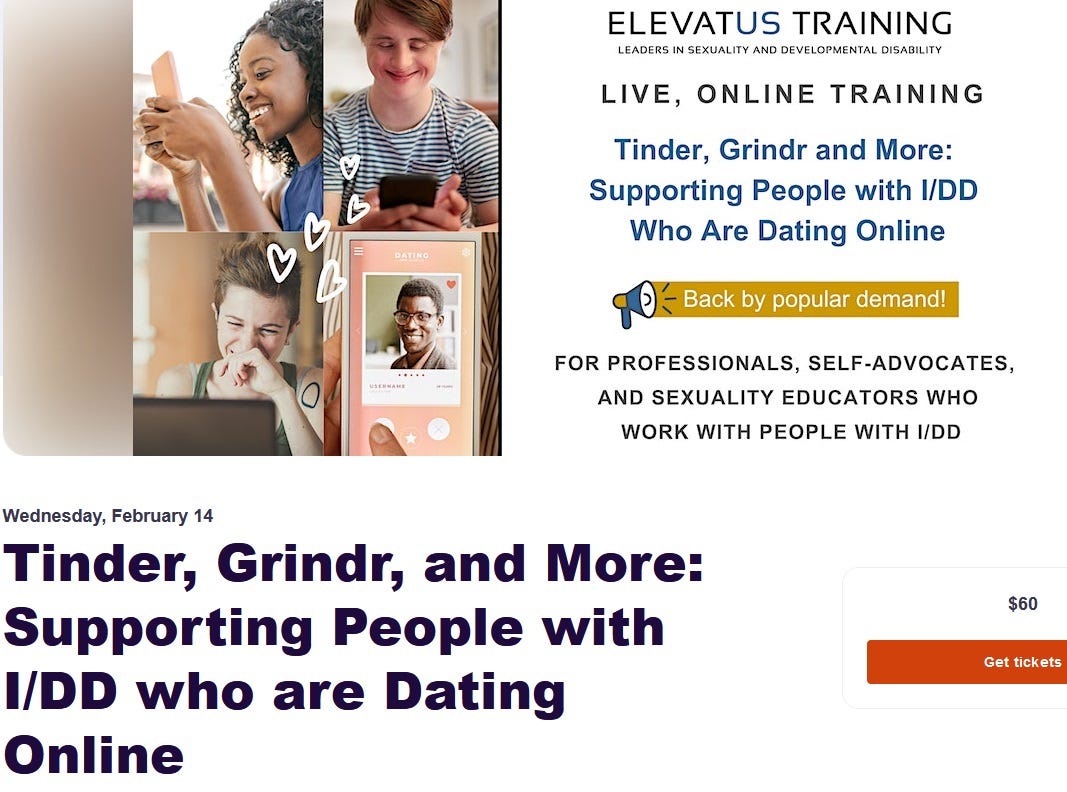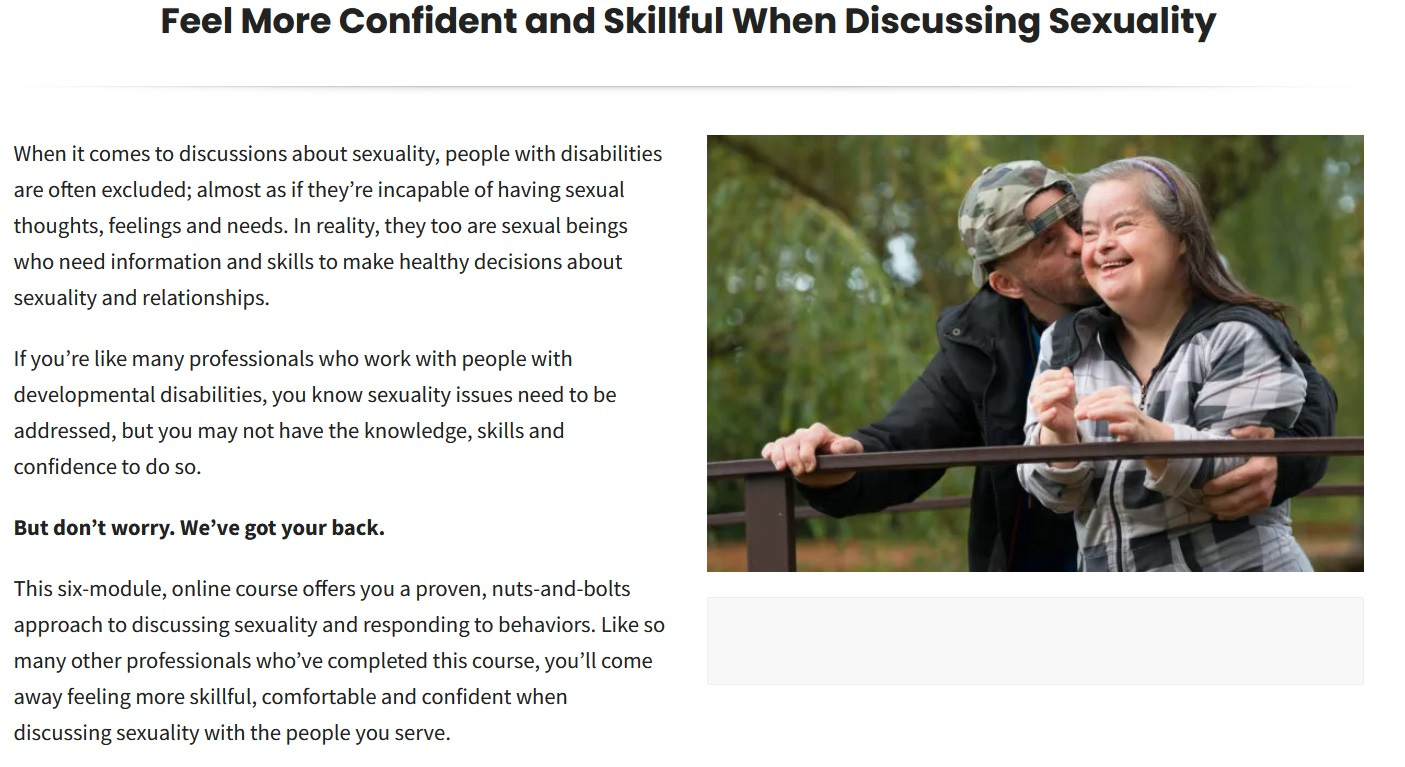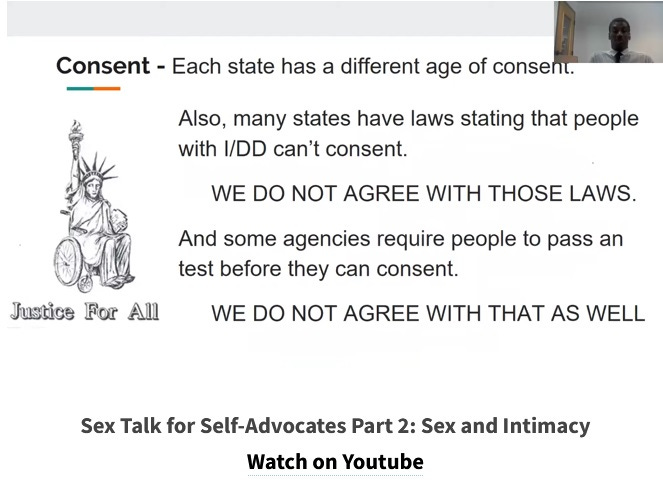In November 2023, Heather Alberda from the Ottawa County Health Department sent an email to the Executive Director of Community Mental Health Ottawa County (CMHOC) Lynne Doyle regarding a staff training opportunity that involved supporting people with Intellectual Disabilities who were interested in online dating using the websites Tinder, Grindr, and more. Lynne Doyle forwarded this email to CMHOC staff.
The training event will be held on Valentines Day, February 14, 2024, and participants will “examine how to set up a profile that will attract more people,” and learn how “to court someone, striking up conversations and finding someone you’re interested in.”
Kate Napolitano, MA, and Katherine McLaughlin, M.ED, are listed as the two experts teaching “Tinder, Grindr, and More: Supporting People with I/DD who are Dating Online.” Kate Napolitano works for an organization called Wildwood Programs that helps individuals with Intellectual and Developmental Disabilities (IDD) lead “independent, productive, and fulfilling lives.” Wildwood Programs offers educational classes for adults and children with autism and other cognitive impairments, as well as daytime recreational programs.
Here is a video of Napolitano teaching people to care for themselves. The video begins with her holding an empty basket, which is intended to represent the viewer. Throughout the video she puts items into the basket while explaining how to fulfill yourself. Perhaps the most disturbing part of this video is when she instructs viewers to scratch an image of a rock, that in my opinion appears to symbolize a male body part, and tells them to imagine that when they scratch it, it will smell like their favorite scent. Watch her scratch the rock at the 17-minute mark.
The other presenter, Katherine McLaughlin, is a nationally recognized expert in teaching IDD individuals about sexuality. She has been involved with the Amaze organization and in writing curriculum. Amaze videos are incorporated into the highly controversial Radical Sexuality Education curriculum that was recently adopted for classroom use in the Young Adult Services program for individuals ages 18-26 with IDD at the Ottawa Area Intermediate School District (OAISD), much to the objection of their parents and guardians.
On the Elevatus company website, Katherine McLaughlin is featured in a nine-part Sex Talk for Self-Advocates Webinar Series. In the series, she and the other panelists discuss the full spectrum of sexual topics including masturbation, sex toys, sexually transmitted diseases, LGBTQ affirmation, and more. In video 2, Sex and Intimacy, near the beginning the panelists discuss “dealing with your parents when they don’t agree.” (10:08) Later in the video the panelists spend several minutes explaining that consent is another word for permission, then go on to proclaim that the Elevatus organization does not agree with laws that explicitly state IDD individuals cannot consent to sex.
(18:50) This is followed by the presenter addressing the questions “What is sex?” and “How do I do it?” The presenters make sure to explain the difference between a public and private place (26:00), and instruct the IDD individuals participating in training to ask someone you trust if you need help with masturbation, providing the example that they may need assistance being propped up to get into the necessary position. (32:20) This is followed by detailed explanations of available sex toy options (35:00).
Near the end of the video, (48:00) Katherine McLaughlin provides a list of reasons why people might have sex.
They feel aroused
They are afraid they are going to lose their partner
Their parents told them not to and they want to show them who is in charge
That detailed description pertained to only video two. There are nine different videos posted on the Elevatus website. In addition, Elevatus offers a Sex Positive Quiz in which website visitors can discover if they are in favor of the Elevatus sexual philosophy, and for $1,095 Elevatus offers a three-day certification course in Sexuality Education for People with Developmental Disabilities.
Since this training opportunity was presented to CMHOC staff members, during the November 27, 2023, CMHOC board meeting, board member Steven Rockman began a 30-minute discussion (1:37:00) about the appropriateness of this type of training and whether or not it is something that CMH staff should be trained to do.
Referring to the CMH mission, Rockman said CMH should focus on issues like housing and integrated health care, then stated, “nowhere is sexualization of the IDD population identified as a priority by CMH or the community.” He further stated, “Our involvement in this in any way would be a reflection of CMH. [] If anything, we should be sending out a warning of the dangers of online dating; not just safely navigating over the thin ice, but just stay off of the thin ice all together.”
Rockman did an excellent job illustrating the predatory nature of these so-called trainers, and how although they portray themselves as being helpful, their training is more akin to grooming vulnerable individuals for sexual contact. During the discussion he explained that the facilitators were not experts in IDD, but called themselves sexuality educators. He also referred to several publications that provide data showing IDD individuals are at an elevated risk of sexual abuse.
Neuroscience, Violent Sexual Predators use Dating Apps as Hunting Grounds
National Institute of Health National Library of Medicine, Sexual Abuse in Adults with Intellectual Disabilities
The discussion was interesting. Although several board members acknowledged they had not researched the situation for themselves, most took turns providing their opinion on the matter. Some board members clearly understood Rockman’s concerns, while others appeared skeptical. Despite the fact that Rockman raised legitimate concerns about the advice that the board was receiving, several board members appeared inclined to continue blindly accepting the recommendations of their CMH experts.
CMH Executive Director Lynne Doyle explained she forwarded this training opportunity to staff because it addressed online safety. “Part of that training also talked about online safety; safety for online dating.” “There was definitely a section that said ‘how to help people be safe in an online dating app.’ and that is what caught my attention as something that could possibly be helpful to staff.” Although her stated reason for passing the training onto staff was safety, Doyle also explained that she “gets announcements from a variety of people and I often forward them on. I don’t always forward them on. We are not promoting this. We are not advocating for this.” And, “It is not a bad thing to know information so that we can help the individuals we serve.”
CMH board member and Commissioner Gretchen Cosby thought a more appropriate topic for CMH staff to address might be, “are you eating well?” She also made the following comments. “It concerns me. There’s data collection that could occur, and private information. There’s a whole realm of possible risk.” “It feels like something we shouldn’t even delve into at all.” “I’m concerned about the risk. [] Those requiring CMH services, are the ones who are the most vulnerable in the population.” “When it gets pushed through the county, then it feels like it is promoted by the county.”
CMH board member Jason Monroe added, “There are so many dangerous unintended consequences of framing this as an opportunity to help people.”
Several board members seemed to miss the entire point. They raised concerns about IDD individuals that did not have caring family members to guide them. They thought it would be better for these individuals to receive “reliable” information through staff and community partners that had received this training course as opposed to finding information on their own. These board members failed to recognize that this training appears to not only NOT be helpful to individuals with IDD, but likely to place them at an even greater risk of being sexually abused.
Board member Terry Goldberg implied some IDD individuals would benefit from learning how to navigate online dating websites as opposed to just being taught to stay off dating websites. “Not all people have parents involved. [] Who is going to guide them.”
Board chair Vonnie VanderZwaag stated, “If you don’t have the information to give them on safety, and just to be able to talk openly, where will they get it if they aren’t people who have a family that supports and discusses with them.”
Board member Dave Parnin stated, “Not everybody is the same. If someone is really vulnerable and doesn’t have the ability to make safe choices, we need to help protect those folks, but I do think there are adults that are able to maybe go that route, and I don’t think we should restrict people.” “There are risks to everything. That’s why there are professional staff that are trained; especially in the area of ethics [] We have to trust staff to make good decisions. I don’t think withholding information from people is the way to go.”
Board member and district 2 commissioner-recall candidate against Lucy Ebel, Chris Kleinjans stated, “It’s [the training course] not attached to any policy that we’re making. It came out of public health. It is to help the people who help the people we serve at their disgression; which we trust them to do. I don’t think this puts any focus on us as advocating for or against something, if we’re just offering staff something that might help them with someone who doesn’t have anybody, or is in a position where they have the capability of conducting a relationship of that nature.” “That information about how to navigate and how not to give information out actually might help someone.”
(2:00:00) Board member Steve Rockman finished with an analogy to more blatantly illustrate the situation to board members that did not fully understand. “This is incredible. Why would this even be a consideration? What if somebody sent a website link that said ‘here’s subscriptions to Hustler Magazine’ for staff. You would know right away, [] that it was inappropriate.”
It seems many problems in America can be traced back to individuals in leadership positions not researching information for themselves, but instead relying on others to direct them. It is ironic that board members, whose responsibility is to set direction, and ensure staff are implementing the vision set forth by the board, are all too willing to abdicate their responsibility, and not readily willing to investigate legitimate concerns raised by other board members, especially when it concerns the county’s most vulnerable population.







